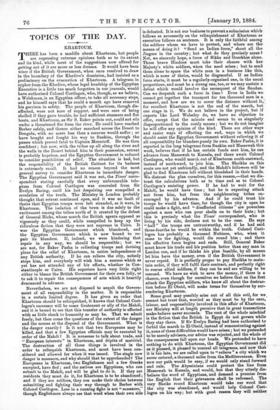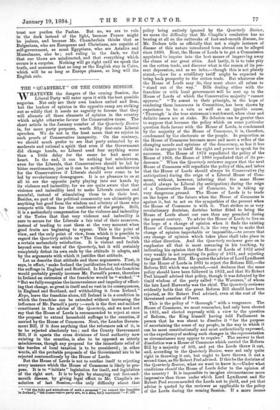TOPICS OF THE DAY.
KHARTOUM.
THERE has been a muddle about Khartoum, but people are expressing extreme opinions both as to its extent and its kind, while most of the suggestions now offered for getting out of it are more or less dreams. It would have been wiser if the British Government, when once resolved to draw in the boundary of the Khedive's dominion, had insisted as a preliminary on the evacuation of Khartoum. A telegram in cypher from the Khedive, whose legal headship of the Egyptian Executive is a little too much forgotten in our journals, would have authorised Colonel Coetlogon, who, though, as we believe, a Welshman, is an Egyptian officer, to take all necessary steps, and he himself says that he could a month ago have removed his garrison in safety. The people of Khartoum, though dis- affected, were not sure of support, and were sure of being shelled if they gave trouble, he had sufficient steamers and flat boats, and Khartoum, as Sir S. Baker points out, could not stir under a threatened fire from the river. He could have reached Berber safely, and thence either marched across the Desert to Dongola, with no more loss than a caravan would suffer ; or have bought and fought his way to Suakim, through the passes which proved fatal to Captain Moncrieff. He was then confident ; but now, with the tribes up all along the river and the wells in the Desert behind him in their possession, retreat is probably hopeless, and the Egyptian Government is reduced to consider possibilities of relief. The situation is bad, but the responsibility of the British Cabinet for its badness is extremely small. It had no reason beyond the most general survey to consider Khartoum in immediate danger. The Egyptian Government said it was not, the Times' corre- spondent stating carefully that every unfavourable tele- gram from Colonel Coetlogon was concealed from Sir Evelyn Baring, until his last despairing one compelled a revelation of the truth. The Ministry in London probably thought that retreat continued open, and it was no fault of theirs that Egyptian troops were left stranded, as it were, in Khartoum. The isolation of the town is due solely to the excitement among the tribes north of it created by the defeat of General Hicks, whose march the British agents opposed as vigorously as they could, while compelled to keep up the ridiculous fiction that they were not supreme in Cairo. It was the Egyptian Government which blundered, and the Egyptian Government which is now bound to re- pair its blunders. If, indeed, we were hindering that repair in any way, we should be responsible ; but we are not, for Baker Pasha is collecting troops and devising plans for the relief of Khartoum, in entire independence of any British authority. If he can relieve the city, nobody stops him, and everybody will wish him a success which as yet has not attended any of his efforts, whether in Con- stantinople or Cairo. His superiors have very little right either to blame the British Government for their own folly, or to ask it to repair the consequences of acts which it heartily denounced in advance.
Nevertheless, we are not disposed to acquit the Govern- ment of all responsibility in the matter. It is responsible in a certain limited degree. It has given an order that Khartoum should be relinquished, it knows that Colonel Coet- logon's successor will be some lieutenant or ally of the Mahdi, and it is bound to see that this transfer of authority is effected with as little shock to humanity as may be. That we admit freely, but then come the questions of the extent of the danger and the means at the disposal of the Government. What is the danger exactly ? Is it not that two Europeans may be killed, and that a few Egyptian officials may be executed by order of the Mahdi ? It is nonsense to talk about trade, and "European interests" in, Khartoum, and depOts of materiel. The destruction of all those things is involved in the order to relinquish Khartoum, and must have been con- sidered and allowed for when it was issued. The single new danger is massacre, and why should that be apprehended/ The Europeans in Khartoum, two Englishmen and a few Greeks excepted, have fled ; and the natives are Egyptians, who can submit to the Mahdi, and will be glad to do it. If they are residents they must do it, for Khartoum is to be abandoned ; and if they are soldiers, they can make their choice between submitting and fighting their way through to Berber with Colonel Coetlogon. Loss in a running fight is not "massacre," though Englishmen always use that word when their own side is defeated. It is not our business to prevent a submission which follows as necessarily on the relinquishment of Khartoum as execution follows on sentence. It is only the faithful among the soldiers whom we have to protect, and where are thern means of doing it ? "Send an Indian force," shout all the Jingoes in the country ; but what do they precisely mean ? Not, we sincerely hope, a force of Sikhs and Goorkhas alone. Those brave Hindoos must take their chance with her Majesty's white soldiers, when the need arises ; but to send them alone to spare the white men in a business like this, which is none of theirs, would be disgraceful. If an Indian force starts, it must be a regularly-organised one, in the usual proportions, and must be a strong one, too, or we may sustain a defeat which would involve the reconquest of the Soudan. Can we despatch such a force in time ? Even in India we cannot get together the transport for ten thousand men in a moment, and how are we to cover the distance without it,' for recollect Khartoum is not the end of the march, but one stage in it. We do not believe in the project, but if experts like Lord Wolseley do, we have no objection to offer, except that the minute end seems to us singularly disproportioned to the costly means ; but we do not imagine' he will offer any opinion of the kind. There are other ways and easier ways of effecting the end, ways in which we' should assist the Egyptian Government without relieving it of all responsibility for blunders purely its own. Baker Pasha, it is reported in the long telegrams from Suakim and Massowah this week, believes that if he has certain funds sent him, he can advance from Massowah to Kassala, and there await Colonel Coetlogon, who would march out of Khartoum south-eastward, instead of northward, to join him. The Sheikhs on this route are not yet unfriendly, and the Mahdi's followers will be glad to find Khartoum left without bloodshed in their hands. We distrust the plan ourselves, for this reason,—that we dis- trust the calculations both as to time and as to Colonel Coetlogon's resisting power. If he had to wait for the Mahdi, he would have time ; but he is expecting attack not from him, but from the neighbouring tribes en- couraged by his advance. And if he could trust his troops he would have time, for though the city is open he could make a fight, and 'disaffected citizens" are powerless against a man who can pour shells on to their huts ; but this is precisely what the Times' correspondent, who is living by his side, declares not to be the case. He says " half " the troops are untrustworthy, and if he had said three-fourths he would be within the truth. Colonel Coet- logon has probably a thousand Nubians, who, when it came to the fighting, would die round him ; and there his effective force begins and ends. Still, General Baker must know his trade and his position better than any man in. London can, and if he thinks his plan feasible, by all means let him have the money, even if the British Government is never repaid. It is perfectly proper to pay Sheikhs to main- tain order, if they will fulfil their contract, and perfectly right to rescue allied soldiers, if they can be and are willing to be rescued. We have no wish to save the money, if there is a chance, even though for ourselves we believe that on the first attack the Egyptian soldiers, who know all about the destruc- tion before El Obeid, will make terms for themselves by sur- rendering Khartoum.
Some good may possibly arise out of all this evil, for we cannot but trust that, worried as they must be by the care, labour, and responsibility involved in this affair of Khartoum, our Ministry will at length perceive that in great transactions make-believe never succeeds. The root of the whole mischief is the fiction that the British in Egypt do not govern while they stay there. If Sir Evelyn Baring had been authorised to forbid the march to El Obeid, instead of remonstrating against it, none of these difficulties would have arisen ; but we pretended to be merely advisers, our advice was rejected, and the whole of the consequences fall upon our heads. We pretended to have nothing to do with Khartoum, the Egyptian Government did as it pleased, it pleased to conceal all telegrams, and now that it is too late, we are called upon to "relieve" a city which we never entered, a thousand miles from the Mediterranean. Even now our path would be easy, if we would only stand forward and rule. The Abyssinians could protect the line from Massowah to Kassala, and would, but that they utterly dis- believe the word of Egyptians, and demand a promise from the English that their grievances shall be redressed. The very Sheiks round Khartoum would take our word that the city was abandoned, and would help Colonel Coet- logon on his way; but with good reason they will neither
trust nor pardon the Pashas. But no, we are to rule in the dark instead of the light, because France might be jealous, and because Mr. Chamberlain thinks that as Bulgarians, who are Europeans and Christians, are capable of self-government, so must Egyptians, who are Asiatics and Mussulmans, also be ; and ruling in the dark, we find that our blows are misdirected, and that everything which occurs is a surprise. Nothing will go right until we speak the truth, and announce that so long as the English stay in Cairo, which will be as long as Europe pleases, so long will the English rule.



































 Previous page
Previous page